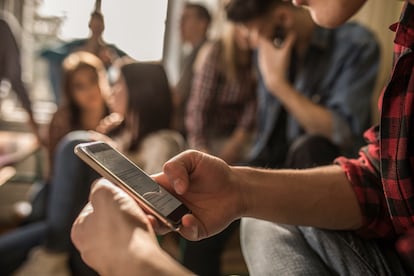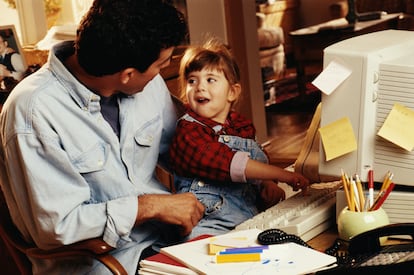Cellphones and teenagers: What if there was a middle ground between prohibition and free rein?
Our generation is better prepared than that of our parents to face the challenges entailed by smartphones and social media and to talk to our children about the potential and risks of technology


The drawing power of a WhatsApp group chat created by several families in Barcelona, Spain, to try to delay as much as possible the arrival of the first cellphone into the hands of boys and girls has been generating a lot of buzz. I am not one to criticize this initiative: I have always considered it an aberration that the smartphone has become the hot present for children between eight and 10 years of age, and I will try to delay, for as long as I can — joining forces with other mothers and fathers from school, if necessary — the arrival of my children’s first cellphone.
Even though my eldest daughter signed on a napkin that she would not own a phone with an internet connection until she was 16, my most rational and realistic side tells me that it will be impossible to achieve the ambitious goal set by clinical psychologist Francisco Villar in his opinion article published by EL PAÍS on October 30.
Two other tremendously timely columns have also been published recently, talking about digital adolescences and providing a comprehensive, compassionate view that tries to defuse a little the concern that the combination of smartphones and adolescence is increasingly causing.
Writer Nuria Labari explains that an Instagram post and the responses it generated made her remember “how painful” adolescence has always been — even when it was analog. According to her, while adults have declared the cellphone as the great problem of today’s teenagers, we have also waived the responsibility of accompanying them in the suffering of their difficulties, forgetting along the way that their problem “has been, and continues to be, pain [...] and that its origin is none other than life itself.”
In the other column, writer Galder Reguera recalls how hooked he used to be on the computer game Championship Manager, to which he devoted countless hours (during which he was supposed to be studying) when he was 18. Over time, he wrote, he concluded that his addiction to the screen was “a necessity” that somehow helped him face the fear he had of life.

As a result of these opinion pieces, I have begun to wonder if perhaps part of the problem lies in the fact that today people are having children at increasingly older ages, and that this age difference opens an unbridgeable generational gap that makes us experience their teenage years — and the presence of technology — with stress and anxiety. In that sense, all my alarms go off when I hear someone say that we are the first generation of mothers and fathers to face something like this. I think about my parents’ generation, which brought computers into our homes (into our rooms, to be exact) when we were barely 12 or 13 years old and, not much later, added a 56 kbps modem that allowed us to surf (at a snail’s pace) the world wide web. Our parents had no idea how a computer worked. Nor what the internet was, what windows it opened to their children or what dangers they were exposed to. The professionalization of parenthood was not a thing yet. They just bought us the computer because it was synonymous with modernity; because all our friends had it (an argument that never fails); because, supposedly, we needed it for school.
When it came down to it, however, we did not use it much for academic purposes. We mostly used it to chat with strangers, download music, access those early porn websites to see erotic photos (downloading videos was out of the question), exchange our Hotmail addresses to chat via Messenger or to play, just like Galder Reguera, the rustic computer games of the time. It would be impossible to calculate all the hours that I devoted to these tasks as a teenager, but if they counted as work hours, I would be retired by now.
As if this were not enough, before we turned 16 our parents had already put the first bulky cellphones in our hands. Because they were synonymous with modernity, too, as a way to keep tabs on us and, again, because everyone else had one. True, those phones did not have even a thousandth of the range that today’s devices have, but I remember devoting hours to the Nokia snake game and spending a lot of time coming up with ways to reduce the amount of characters to be able to say more in less space (and pay less, of course) in the text messages that we sent. RememberWritingLikeThis?

I remember receiving and answering messages in class and making signings for my Hattrick team during those classes in which we had one computer per student. And I remember, above all, my mother coming into my room again and again to find me with my face glued to the screen, asking me if I didn’t have to study or if I wasn’t planning to go to bed (depending on what time it was); and then leaving, unconvinced I suppose, when I replied that I had only paused to rest for a moment.
My grades did not suffer as a result of this uncontrolled screen time. I remember fondly my teenage years (I’m sure that I’ve romanticized them) and I left them behind, as well as that screen overdose, as a more or less functional adult. My friends did, too. It is true that, as Labari also points out, smartphones make everything harder, but I believe that our generation is better prepared than that of our parents (we are familiar with technology, even if we are not always the best example) to face this major challenge. To talk to our children about the potential and the risks of this technology; to, from a certain age that we deem responsible, set limits without having to forbid; and, above all, as Reguera stated, to remember that we were also teenagers once, empathize with them and emotionally accompany them in their (painful or not) transition to adulthood. Journalist Manuel Jabois already put it in writing: “Growing up is a betrayal.”
Sign up for our weekly newsletter to get more English-language news coverage from EL PAÍS USA Edition
Tu suscripción se está usando en otro dispositivo
¿Quieres añadir otro usuario a tu suscripción?
Si continúas leyendo en este dispositivo, no se podrá leer en el otro.
FlechaTu suscripción se está usando en otro dispositivo y solo puedes acceder a EL PAÍS desde un dispositivo a la vez.
Si quieres compartir tu cuenta, cambia tu suscripción a la modalidad Premium, así podrás añadir otro usuario. Cada uno accederá con su propia cuenta de email, lo que os permitirá personalizar vuestra experiencia en EL PAÍS.
¿Tienes una suscripción de empresa? Accede aquí para contratar más cuentas.
En el caso de no saber quién está usando tu cuenta, te recomendamos cambiar tu contraseña aquí.
Si decides continuar compartiendo tu cuenta, este mensaje se mostrará en tu dispositivo y en el de la otra persona que está usando tu cuenta de forma indefinida, afectando a tu experiencia de lectura. Puedes consultar aquí los términos y condiciones de la suscripción digital.








































